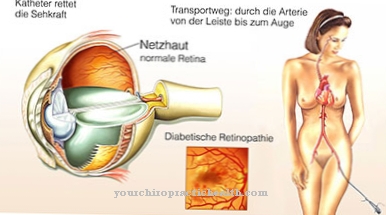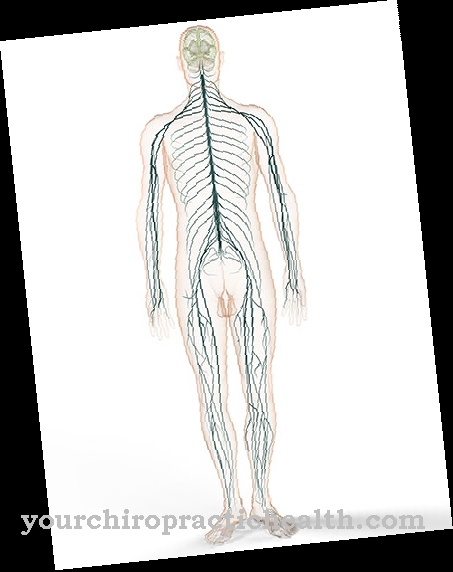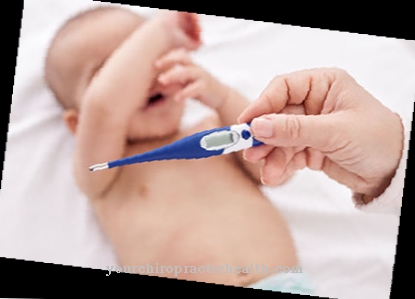Alzheimer, Alzheimer's disease or Alzheimer's disease are names for a pronounced and typical disease of old age. The older people get, the higher the chance of developing this disease. Typical signs of Alzheimer's are memory lapses, personality changes, and a general decline in mental performance.
What is Alzheimer's?

For Alzheimer's, the terms dementia of the Alzheimer's type (Alzheimer's dementia) and Alzheimer's disease are also common.However, all the terms have in common that this disease is a decline in mental performance. In addition, Alzheimer's is characterized by poor memory. This increases as the disease progresses and ultimately leads to a complete loss of personality and judgment.
causes
A combination of hereditary factors, inflammatory processes as well as environmental influences is considered to be the cause for the Alzheimer Suspected illness. According to current medical knowledge, the disease develops through a slow progressive death of nerve cells in the brain.
The reason is harmful deposits, so-called amyloids. This presumably hinders the communication of the nerve cells in certain areas of the brain. The changes begin long before the first symptoms appear. It is believed that certain influences can promote Alzheimer's.
These include, for example:
- more severe brain damage in the course of life
- heavy nicotine consumption
- high blood pressure
- arteriosclerosis
- unhealthy diet
- Hypothyroidism
Basically anyone can get Alzheimer's disease. However, the risk increases with age. However, some factors can be eliminated through a healthy lifestyle.
According to the latest studies¹, smokers in particular are at high risk of developing Alzheimer's. These negative effects on the brain were found in both long-term smokers and former smokers. The risk of developing Alzheimer's disease is twice as high for smokers than for non-smokers. Furthermore, the intellectual abilities of smokers already decrease significantly from the age of 50, while in non-smokers a significant reduction in intellectual activities can only be observed 20 years later.
¹ University College London Whitehall II study 2012
You can find your medication here
➔ Medicines against memory disorders and forgetfulnessSymptoms, ailments & signs
The symptoms that occur in Alzheimer's dementia are manifold. However, some typical signs can be seen on closer observation. Most older people suspect Alzheimer's disease because of their noticeable forgetfulness. Without the affected person noticing, the nerve cell extensions and connections within the brain die over years.
In the further course of the disease, the nerve cells themselves are also affected, which leads to a decline in brain tissue. Depending on which area of the brain is damaged, the abilities and functions there decrease. This is noticeable in short-term memory, judgment, language and the ability to do routine work. The behavior of the person affected, his communication, his feelings and his recognition skills also suffer from dementia.
Medicine divides Alzheimer's disease into an early, middle, and late stage. These stages can extend over a period of several years. Initially, mood swings, memory problems and loss of performance occur. In addition, the patient no longer expresses himself precisely and reduces his social contacts.
In the middle stage, the intellectual loss of performance progresses and the psyche and personality of the person concerned change increasingly. In addition, the patient needs help in handling everyday things.
In the late stage, the patient can no longer do without outside help. Furthermore, physical symptoms such as loss of bladder and bowel functions, falls, seizures and swallowing disorders appear. There is also a risk of fatal infections.
course
Alzheimer's disease does not proceed in the same way in all patients. The course is usually characterized by three stages.
1st phase: In the early phase of the disease, patients often feel tired, lackluster and powerless. You suffer from mood swings and lose spontaneity. The first slight memory disorders appear. In addition, the sick react more slowly and shy away from new things. Nevertheless, at this stage, those affected are only slightly impaired in their activities. An independent life without help is still possible.
2nd phase: Alzheimer's sufferers can only cope with everyday life to a limited extent.
- mental loss increases
- increased occurrence of behavior changes, language difficulties and forgetfulness
- Memory loss progresses
- possibly occurring delusions
- Recognition disorders
- Difficulty performing simple tasks such as household chores
- Neglect of hygiene
Even at this stage, help from nursing staff or relatives is useful and necessary. It should be worked towards that Alzheimer's sufferers can carry out daily activities independently as long as possible.

3rd phase: At this stage, the disease has progressed so far that the sick are dependent on constant care and help. The course of the disease in the third stage is characterized by:
- Memory and speech decay
- complete loss of everyday skills
- Recognition disorders even in close caregivers
- Difficulty eating and swallowing
- Bladder and fecal incontinence
In this last difficult phase, people with Alzheimer's mostly only have innate reflexes. This means that instinct and feelings are there. A loving and understanding as well as caring care contributes a lot to the well-being of the patients, so that they still feel happy and secure.
When should you go to the doctor?
Alzheimer's should be treated by an appropriate doctor as early as possible so that this phenomenon can be effectively counteracted. The first signs of Alzheimer's are usually a loss of recent memories. Affected people who suffer from Alzheimer's will initially suffer from small memory gaps. At this point in time, the first measures should be taken so that the disease can be delayed as well as possible. In such a case, the person's memory must be stimulated to work again.
This clinical picture can also be effectively combated and inhibited with appropriate medication. However, those who do not receive appropriate treatment with the right medication for Alzheimer's disease run the risk of a more rapidly progressing disease. The symptoms or forgetfulness will worsen immensely, so that the respective person cannot recall memories in long-term memory. Significant events in one's own biography can no longer be called up.
Unfortunately, according to the current state of medicine, there is no complete cure for Alzheimer's. However, the disease can be postponed for a long time so that the person concerned is made as comfortable as possible. For this reason, medical help should be sought immediately at the first signs of Alzheimer's.
Doctors & therapists in your area
Treatment & Therapy

However, to treat Alzheimer's disease effectively, a combination of drug and non-drug treatment is necessary. Non-drug measures always aim to maintain the patient's independence for as long as possible and thus to delay the need for care. Alzheimer's patients are supported mentally and physically by various therapeutic measures. However, Alzheimer's disease is still not entirely curable. You can only slow it down.
Outlook & forecast
The course of Alzheimer's disease can vary from patient to patient. However, the prognosis is similar for those affected. Alzheimer's disease is insidious and leads to death within eight to ten years on average. The actual cause of death is usually comorbidities such as pneumonia or blood poisoning, triggered by pressure ulcers as a result of being bedridden.
As a rule, those affected are dependent on help and care relatively quickly after diagnosis and often develop psychological complaints as a result of this stress. The loss of health can only be temporarily stopped in a small proportion of patients.
Comprehensive medicinal and psychosocial measures now make it possible to temporarily stabilize brain performance and give those affected back a feeling of control. However, this is only possible in the early stages. As the disease progresses, the weakened immune system causes accompanying symptoms that ultimately lead to death. So there is no prospect of a full recovery in Alzheimer's disease. Modern therapeutic measures can, however, slow down the course of the disease and enable those affected to continue living relatively normally.
You can find your medication here
➔ Medicines against memory disorders and forgetfulnessAftercare
Alzheimer's occurs in different phases. It is characterized by progression, as a result of which patients ultimately require complete care. This progression can be short or take several years. Once diagnosed, the disease has to be accepted. It is not curable.
This means that follow-up care, as is usual with other ailments, cannot have the function of preventing recurrence. Doctors, on the other hand, try to eliminate complications and support patients in their everyday lives. Continuous follow-up care takes place after a diagnosis. The attending physician regularly prescribes medication, the dosage of which he adapts to the state of the disease.
In addition, he also prescribes psychosocial training such as occupational therapy and physiotherapy. The intervals at which a patient has to present themselves is agreed individually. As part of a follow-up examination, doctors are primarily dependent on the descriptions of relatives and friends. You notice mental changes most intensely.
Your practice descriptions are usually more meaningful than the snapshot of an examination. Patients often have to take small mental tests during consultation hours. Neuropsychological methods were developed for this purpose. To rule out further diseases, some medical professionals also order an MRI or CT scan. Even blood tests are meaningful and common.
You can do that yourself
Self-help plays a role in Alzheimer's, especially at the beginning of the disease. People with advanced dementia are often in need of care or need more support. The requirements that arise from this can no longer be adequately met with simple measures.
Memory aids can be used to better deal with memory problems in everyday life. For example, a small note on the bathroom mirror can remind you to take medication. Solid medication can be filled into a weekly dispenser so that no tablet is taken twice. Whether the person concerned can take on this task himself or whether help from a second person is necessary depends on the individual case.
A weekly dispenser is a medicine jar with various compartments, each assigned to a day of the week. When it comes to memory problems, many people are unsure whether they have already taken a tablet or not. However, if the appropriate tablet is missing from the dispenser, it is easy to tell that it has already been taken. The independent use of a weekly dispenser or a similar aid, however, requires that the person concerned does not suffer from great confusion and, for example, is aware of which day of the week it is and which tablets to take and when.
Particular attention should also be paid to regular drinking and eating in Alzheimer's disease. Under certain circumstances, small reminder aids can also be sufficient here if the person concerned is still very fit in everyday life. Otherwise, it makes sense for relatives to regularly remind them to drink and eat.


.jpg)










.jpg)

.jpg)
.jpg)











.jpg)